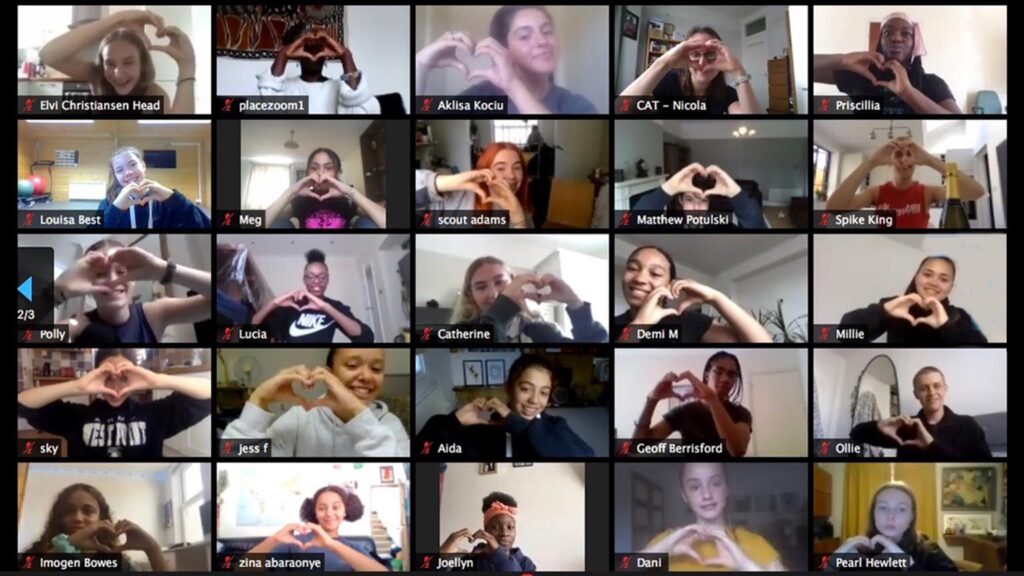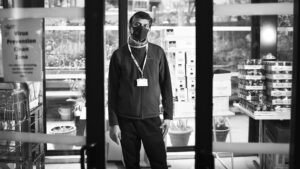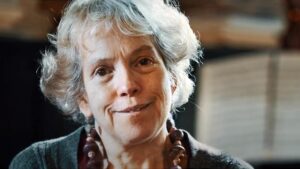

Saviour of Culture:
The Place, Euston
- Interview: Hina Pandya
- Portrait: Hugo Glendinning
- Covid Champions Awards
Saviour of Culture award is brought to you with our charity partner Roundhouse

Right Place, Strange Times
Covid-19 has wrought disruption upon every facet of life, but the impact on the culture industries has been the near total shut-down of the sector. Dark concert halls, theatres and nightclubs; countless tours, festivals and productions shelved; hard-fought career paths suddenly – cruelly – deemed ‘unviable.’
Yet amidst this ongoing existential uncertainty, creative people and institutions are still finding ways to share, to educate and to celebrate the arts.
Camden is full of examples of such passion (see the other shortlisted nominees), but it was the huge impact that The Place managed to have with it’s lockdown response that won over our judges. Marcus Davey, CEO of the Roundhouse heaped praise on the fact that “they produced over 50 videos for Partner School children to dance to at home, a project which I thought was going right to the heart of the community, and was really great.”
The Place describes itself as a ‘creative powerhouse for dance development’ and is home to the London Contemporary Dance School, a 288-seat theatre, and an extensive range of classes and courses for the very young, very old and all in-between. 2020 was to have been a year of celebration to mark the dance school’s 50th anniversary. Instead, it will be remembered as a period of dramatic upheavals, delivering courses to students online as we reported in the summer, then attempting in-person classes under strict government guidelines on safety. But in many ways, the unique blend of professional and amateur training, combined with the unwavering passion and dedication of the team, gave The Place the required tenacity to somehow press on.
Hina Pandya speaks to Chief Executive Officer Clare Connor – who’s life in dance seems to have truly led her to this moment – about dancing on through a pandemic.
The 20-year CV
I meet Clare the best way you can meet anyone nowadays, on Zoom, and despite being a screen away, her warmth and genuine passion come through in an instant. Delighted with this award, she immediately wants to share the accolade with one of her team, the chair, Alan Bishop. “He’s a Camden boy, born and bred,” she says, explaining that The Place is so committed and proud of being in Camden, that this locally-voted award means a great deal to the entire team.
Some companies have ‘the customer journey’ as the heart of their business; The Place embody something called the artist’s journey.
“The artist’s journey can begin with us if you’re 60 or 6,” says Clare, something she would know, as from her very foundations she “learned to learn through dance.”
Hailing from a single-parent family without access to dance through anything other than school, she had a great PE teacher – a dancer who inspired and encouraged her. Dance being absent from any curriculum at that time, she would retreat to recreational after-school activities, developing her passion for movement.
Hardship funds enabled Clare to attend ballet classes and, at 18, successfully audition for The Place itself. She prides herself in that experience, which gave her an awareness of what it meant to find confidence, expression, to be understood, and to be appreciated through a physical way of learning. She graduated with a first.
Some of our sister cultural organisations are not going to make it - we have a huge job on our hands
Clare Connor Tweet this
What is clear is that Connor’s background has given her the almost intuitive ability to seek out the most dynamic ways forward for the art she loves. After performing, her career extended to teaching at Islington Green School and Newham connecting students back to The Place where she also worked. From here she went onto the Stratford Circus Art Centre and to the Southbank in Waterloo. “They joked really that my CV was a twenty-year CV for a job at The Place.” We laugh, because as wild as it sounds, it really is true.
“Dance isn’t always recognised as a valid method to learn, and I think some people feel a vocational education is not as valid as an academic,” she says. “It’s so important our students and young people have a broad and balanced curriculum, and they need to have access to the arts as well as to other subjects.”
It reminds me of that axiom, ‘if you judge a fish by the way it climbs a tree, it will spend its whole life believing it’s stupid’. Yet in a lockdown many young people aren’t exploring physical creativity, making the persistence of The Place continuing its education programmes during restrictions even more vital, allowing confidence to flourish in a way which can then spill into other subjects and improve mental health.
“What I’ve said to my colleagues is that we will still keep going, and then we have a bigger duty than ever, because some of our sister cultural organisations are not going to make it – we have a huge job on our hands.”

What is clear is that Connor’s background has given her the almost intuitive ability to seek out the most dynamic ways forward for the art she loves. After performing, her career extended to teaching at Islington Green School and Newham connecting students back to The Place where she also worked. From here she went onto the Stratford Circus Art Centre and to the Southbank in Waterloo. “They joked really that my CV was a twenty-year CV for a job at The Place.” We laugh, because as wild as it sounds, it really is true.
“Dance isn’t always recognised as a valid method to learn, and I think some people feel a vocational education is not as valid as an academic,” she says. “It’s so important our students and young people have a broad and balanced curriculum, and they need to have access to the arts as well as to other subjects.”
It reminds me of that axiom, ‘if you judge a fish by the way it climbs a tree, it will spend its whole life believing it’s stupid’. Yet in a lockdown many young people aren’t exploring physical creativity, making the persistence of The Place continuing its education programmes during restrictions even more vital, allowing confidence to flourish in a way which can then spill into other subjects and improve mental health.
“What I’ve said to my colleagues is that we will still keep going, and then we have a bigger duty than ever, because some of our sister cultural organisations are not going to make it – we have a huge job on our hands.”

I’m the first female Chief Exec mum. I would hope whoever comes after me is also a first
Clare Connor Tweet this
BLM in the DNA
Connor prides The Place on being unlike any organisation in the world. Its ability to train professionals, yet also host those who are simply participating for enjoyment or fitness at any age or level gives them a unique edge. It is surely the secret to their robust ability to stay successful, even in a pandemic. She has a keen eye for innovation in dance, that expands, not just to movement, but beyond into our multicultural neighbourhood and embraces the energy, dynamism and consciousness around the Black Lives Matter movement.
Since coming into the role in 2017, she has made significant changes to the programme, and broken with 50 years of traditional methodology on teaching dance, to create something new and relevant to modern times: “We’ve always had an international DNA and multi-ethnic approach, but the programme has been Eurocentric, which is why we wanted to change.”
With BLM protests shaking things up globally under lockdown, The Place “were already on that journey”, says Clare. Instead of some additional hip-hop or South Asian dance on the side, “we wanted it to be at the centre of what we do. So social justice, Black Lives Matter, equality and diversity really are the priority. We are changing the programmes in how they are being taught and what is being taught, so that is a radical shift.”
Her insight and experience extend further to those who may have strong opposition in their families to training in the arts and/or cultural issues that may be serious obstacles to them pursuing dance “we have young people who need support to break those moulds, and I’m hoping the new programme will do much more to make that happen.”
However, she accepts that while parents want their children to dance and experience the arts “it’s when they want to take it seriously as a career that the questions arise.”
Professional dance, she explains “has a toughness to it. You need to be prepared to go beyond what you think is normal, to build your resilience, your stamina, your physical strength, and you have to be prepared to work in a way that is not valued by your family, who won’t have gone through that training – so you have emotional intelligence, and you have to build your case because everyone will challenge you on why you’re doing it, and, if you’re a girl, more so. I had all kinds of sexism to deal with along the way – that’s dance.”

In the middle of a crisis we can’t default to the norm, we have to default to different
Clare Connor Tweet this
Her success does not impede honest humility “as a woman who comes from a low socio-economic background, with some privilege as a white woman, but from a place of challenge, I’m the first female Chief Exec mum. I would hope whoever comes after me is also a first.”
Shaking things up is unapologetically why she came to this role. “I didn’t come for the status quo, I came to honour the founders who were pioneers. I came to honour the charge, which is that dance, even in the arts, is seen as lesser in education, we’re having to fight for the cause as dance is at the bottom of the pile.”
Connor explains that it is her own personal succession planning drive that puts the arts centre stage, also indicating those from less privilege backgrounds can lead. She says it “is really what fires my belly, and it’s given me the privilege of an amazing career to date.”
She talks excitedly about her students and the film they want to make for their graduation, how they want her to speak at the start and the end of the film, and how she’s giving them the autonomy to develop and craft production.
The conversation slips into a touching homage to the founder – artistic director Bob Cohan – who sadly passed away last week. Such is the homogeny of The Place; the 2020 students asked him to speak at their graduation, communicating eloquently about the war and what its’s like to come through near death, and to find your way back through the arts despite it being seen as less important.
“Bob will forever be in the hearts and minds of all of those who knew and worked with him at The Place,” says Clare. “He inspired us with his vision for a life lived with dance. His legacy spans way beyond The Place into the thousands and millions of people who have been influenced by contemporary dance in the United Kingdom.”
We share an awkward Zoom moment in where I feel a lump in my throat, something that has been happening at odd times in this pandemic, with so much death day by day. Then to my relief she admits she too is wiping tears; poetically she says “everything is close to the surface, we are at the edges of ourselves.”
The sign of a good leader is to recognise those who build your success, and Connor does it consistently. She notes the team of governors, all ten of them who attend every meeting, even the additional ones they needed as a result of the pandemic. She’s gratefully aware that she did not win this award alone, that there are many others who contribute to The Place’s success daily.
Lockdown had stimulated invitations for collaborations far and wide and invitations to be in Zoom-like spaces together, “because people can’t find solutions on their own, and also because there needs to be a temperature check of what’s on the ground, so we’ve been able to share that information more readily.” This extended as far as Herne Bay and Newcastle, as well as weekly meetings with the National Dance Consortium, with Sadler’s Wells, big touring companies and independent artists.
Then externally there are wider networks growing, including discussing health and well-being with Camden Council, Imperial College London and The Wellcome Trust. Clare explains that these conversations are even more vital, because they reach outside her sector.
“When we can join together and understand each other better, that is actually where the arts have their power,” she says. “I know my job is to find people who are not like me. In the middle of a crisis we can’t default to the norm, we have to default to different.”



Share this with friends
More Covid Champions

High Street Heroes: The Team at Tesco, Swains Lane
How the hard work and long hours by the staff was truly appreciated by locals during the pandemic

Diversity & Equality Leaders: Age UK Camden
Abul Choudhury tells us how the charity managed lockdown for Camden’s most vulnerable, from food parcels to vaccinations

Care Champion: Carolyn Hayman for C4WS, Somers Town
When she saw media reports of women losing jobs and homes as a result of the Covid shutdown,


